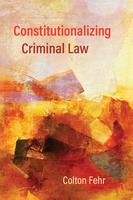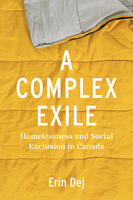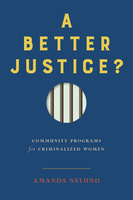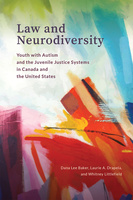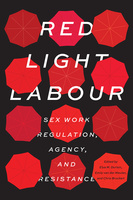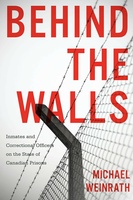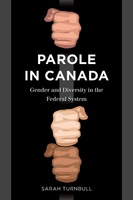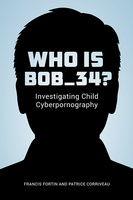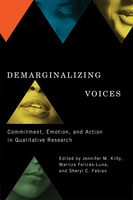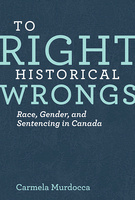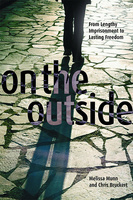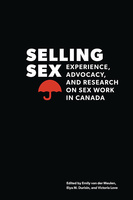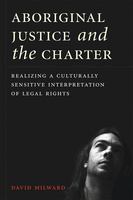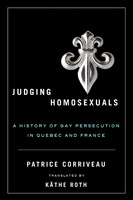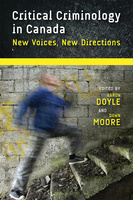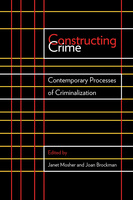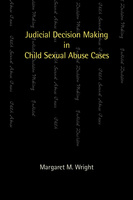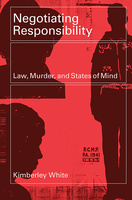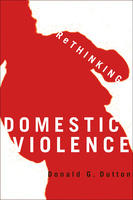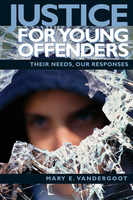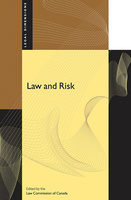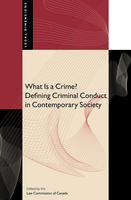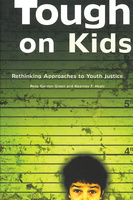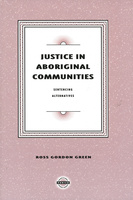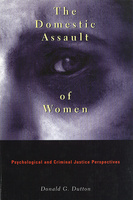Handing Over the Keys
Indigenous Peoples and Carceral Injustice
Handing over the Keys explores the intergenerational impacts of carceral injustice on Indigenous peoples and suggests policy approaches that will disrupt the harm.
Ancillary Police Powers in Canada
A Critical Reassessment
Ancillary Police Powers in Canada investigates the scope of police powers under Canadian common law, and the implications for our rights, freedoms, and individual liberty.
Sexual Assault in Canadian Sport
Is sexual assault tolerated in Canadian sport? After reaching the provocative conclusion that sexual assaults are not only accepted but normalized and even promoted, Sexual Assault in Canadian Sport offers constructive strategies to make sport safer.
Power Played
A Critical Criminology of Sport
Power Played represents a distinctly critical criminology of sport, blowing the whistle on the harm, violence, and exploitation embedded in contemporary sport and sporting cultures.
Changing of the Guards
Private Influences, Privatization, and Criminal Justice in Canada
Changing of the Guards is the first comprehensive assessment of how for- and not-for-profit private organizations are reshaping Canadian criminal justice processes and outcomes.
Constitutionalizing Criminal Law
Constitutionalizing Criminal Law explains why the Supreme Court of Canada’s jurisprudence considering the constitutionality of criminal laws fails to strike a principled balance between the need to increase the coherency of the criminal law while maintaining the legitimacy of judicial review.
Disability Injustice
Confronting Criminalization in Canada
In Disability Injustice, scholars and activists deliver a much-needed and long overdue analysis of disability and criminalization in Canada.
A Complex Exile
Homelessness and Social Exclusion in Canada
A Complex Exile challenges the medicalization of homelessness, which emphasizes individual causes and solutions to homelessness, and argues that we must transform how we respond to homelessness in Canada.
A Better Justice?
Community Programs for Criminalized Women
Do community programs offer an effective alternative to imprisonment for women within the criminal justice system? A Better Justice? sets out the case.
Law and Neurodiversity
Youth with Autism and the Juvenile Justice Systems in Canada and the United States
Through a comparison of juvenile justice systems in Canada and the United States, Law and Neurodiversity examines gaps of accommodation and consideration for youth with autism.
Red Light Labour
Sex Work Regulation, Agency, and Resistance
Red Light Labour, the first book to examine sex work policy and advocacy since Canada v. Bedford, showcases the perspectives of sex workers and activists and deepens our understanding of sex work as labour.
Accusation
Creating Criminals
This interdisciplinary collection challenges conventional views on crime and criminals, examining how ideas and rituals of criminal accusation produce both accusers and accused.
Behind the Walls
Inmates and Correctional Officers on the State of Canadian Prisons
Based on candid conversations with inmates and correctional officers in federal and provincial prisons, Behind the Walls offers an up-to-date and balanced account of the corrections landscape in Canada.
Parole in Canada
Gender and Diversity in the Federal System
Parole in Canada explores how concerns about aboriginality, gender, and the multicultural ideal of “diversity” have altered parole policy and practice – and asks whether these changes go far enough.
Who Is Bob_34?
Investigating Child Cyberpornography
Researchers Francis Fortin and Patrice Corriveau investigate the clandestine world of child cyberpornography to understand who produces, exchanges, and consumes pedo-pornographic images.
Demarginalizing Voices
Commitment, Emotion, and Action in Qualitative Research
By openly discussing the challenges of adopting innovative research methods, scholars of marginalized populations bring discussions of methodology from the fringes to the centre of debate in the social sciences.
To Right Historical Wrongs
Race, Gender, and Sentencing in Canada
A bold questioning of culture-based reparative justice initiatives – the political culture that inspired them and their efficacy in an age in which historically marginalized people are disproportionately represented in Canadian prisons.
Sex Work
Rethinking the Job, Respecting the Workers
A lucid and unflinching argument for the reframing of the debate on sex work, ending limiting moralistic approaches, and respecting the unique perspectives of workers.
On the Outside
From Lengthy Imprisonment to Lasting Freedom
Drawing on the narratives of men who have served lengthy prison sentences, this book illuminates the tumultuous journey from life in a penitentiary to success in the community.
Selling Sex
Experience, Advocacy, and Research on Sex Work in Canada
A diverse and comprehensive dialogue between sex workers, advocates, and researchers that looks at sex work in a new way.
Aboriginal Justice and the Charter
Realizing a Culturally Sensitive Interpretation of Legal Rights
This book explores the tension between Aboriginal justice methods and the Canadian Charter of Rights and Freedoms, while searching for practical ways to implement Aboriginal justice.
City of Order
Crime and Society in Halifax, 1918-35
A groundbreaking exploration of the causes and consequences of Halifax’s tough-on-crime measures in the interwar era.
Judging Homosexuals
A History of Gay Persecution in Quebec and France
This history examines shifting constructions of homosexuality over time through a comparative analysis of gay persecution in France and Quebec.
Critical Criminology in Canada
New Voices, New Directions
A new generation of critical criminologists examines the future of criminology and criminal justice in Canada.
Constructing Crime
Contemporary Processes of Criminalization
Five unique case studies reveal how crime is being constructed and enforced in contemporary Canada.
Criminal Artefacts
Governing Drugs and Users
By looking curiously on the criminal addict as an artefact of criminal justice, this book asks us to question why the criminalized drug user has become such a focus of contemporary criminal justice practices.
Moving Toward Justice
Legal Traditions and Aboriginal Justice
Exploring constitutional and administrative policy changes that underscore the urgent need for Aboriginal justice reform.
Judicial Decision Making in Child Sexual Abuse Cases
Laws and definitions of sexual abuse may have changed since the 1980s, but this book demonstrates that interpretation of the law still depends on the social construction of children and on judges’ own understanding of what constitutes child sexual abuse.
Negotiating Responsibility
Law, Murder, and States of Mind
Kimberly White provides an essential point of reference from which to evaluate current criminal law practices and law reform initiatives in Canada.
Sexing the Teacher
School Sex Scandals and Queer Pedagogies
A provocative study of public and professional responses to female teacher sex scandals, this book employs queer theory, psychoanalysis, and feminist film theory to examine sensationalized legal cases, including Mary Kay Letourneau, Amy Gehring, and Heather Ingram.
Sex Workers in the Maritimes Talk Back
Sex workers in three Maritime cities discuss violence and safety, health, politics, and public perception of the trade, portraying the best and the worst facets of their working lives.
Rethinking Domestic Violence
Dutton’s rethinking of the fundamentals of intimate partner violence is essential reading for psychologists, policy makers, and those dealing with the sociology of social science, the relationship of psychology to law, and explanations of adverse behaviour.
Justice for Young Offenders
Their Needs, Our Responses
This ground-breaking analysis of complex issues of youth justice challenges the assumptions behind Canada’s approach to youth justice and mental health disorders.
Law and Risk
Demonstrating the linkages between law and risk, these essays tackle some difficult topics, including dangerous offenders, sex offender notification, drug courts, genetic research, pesticide use, child pornography, and tobacco advertising.
What Is a Crime?
Defining Criminal Conduct in Contemporary Society
What Is A Crime? examines how we define criminal conduct in contemporary society, and how we respond to it once it has been identified.
Tough on Kids
Rethinking Approaches to Youth Justice
In this compelling, thought-provoking and sometimes heartbreaking book, the authors use the stories of their young clients to illustrate the very real costs of the current system, analyzing theories behind youth justice, and how these are reflected in Canadian legislation both past and present.
Justice in Aboriginal Communities
Sentencing Alternatives
Using several Aboriginal communities as case studies, Green analyzes the successes and challenges for alternative sentencing within the Canadian criminal justice system.
Qualities of Mercy
Justice, Punishment, and Discretion
These top scholars probe the discretionary use of power and inquire how it has been exercised to spare convicted criminals from the full might of the law.
The Domestic Assault of Women
Psychological and Criminal Justice Perspectives
Argues that only by understanding the psychology of both the aggressors and the victims of wife assault can we generate informed social and criminal justice policy.





